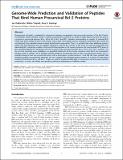| dc.contributor.author | Taipale, Mikko | |
| dc.contributor.author | Keating, Amy E. | |
| dc.contributor.author | DeBartolo, Joseph Vincent | |
| dc.date.accessioned | 2014-09-09T14:11:43Z | |
| dc.date.available | 2014-09-09T14:11:43Z | |
| dc.date.issued | 2014-06 | |
| dc.date.submitted | 2013-12 | |
| dc.identifier.issn | 1553-7358 | |
| dc.identifier.issn | 1553-734X | |
| dc.identifier.uri | http://hdl.handle.net/1721.1/89221 | |
| dc.description.abstract | Programmed cell death is regulated by interactions between pro-apoptotic and prosurvival members of the Bcl-2 family. Pro-apoptotic family members contain a weakly conserved BH3 motif that can adopt an alpha-helical structure and bind to a groove on prosurvival partners Bcl-x[subscript L], Bcl-w, Bcl-2, Mcl-1 and Bfl-1. Peptides corresponding to roughly 13 reported BH3 motifs have been verified to bind in this manner. Due to their short lengths and low sequence conservation, BH3 motifs are not detected using standard sequence-based bioinformatics approaches. Thus, it is possible that many additional proteins harbor BH3-like sequences that can mediate interactions with the Bcl-2 family. In this work, we used structure-based and data-based Bcl-2 interaction models to find new BH3-like peptides in the human proteome. We used peptide SPOT arrays to test candidate peptides for interaction with one or more of the prosurvival proteins Bcl-x[subscript L], Bcl-w, Bcl-2, Mcl-1 and Bfl-1. For the 36 most promising array candidates, we quantified binding to all five human receptors using direct and competition binding assays in solution. All 36 peptides showed evidence of interaction with at least one prosurvival protein, and 22 peptides bound at least one prosurvival protein with a dissociation constant between 1 and 500 nM; many peptides had specificity profiles not previously observed. We also screened the full-length parent proteins of a subset of array-tested peptides for binding to Bcl-x[subscript L] and Mcl-1. Finally, we used the peptide binding data, in conjunction with previously reported interactions, to assess the affinity and specificity prediction performance of different models. | en_US |
| dc.description.sponsorship | National Institutes of Health (U.S.) (Award GM084181) | en_US |
| dc.description.sponsorship | National Science Foundation (U.S.) (Grant 0821391) | en_US |
| dc.description.sponsorship | American Cancer Society (Postdoctoral Fellowship PF-12-155-01-DMC) | en_US |
| dc.language.iso | en_US | |
| dc.publisher | Public Library of Science | en_US |
| dc.relation.isversionof | http://dx.doi.org/10.1371/journal.pcbi.1003693 | en_US |
| dc.rights | Creative Commons Attribution | en_US |
| dc.rights.uri | http://creativecommons.org/licenses/by/4.0/ | en_US |
| dc.source | Public Library of Science | en_US |
| dc.title | Genome-Wide Prediction and Validation of Peptides That Bind Human Prosurvival Bcl-2 Proteins | en_US |
| dc.type | Article | en_US |
| dc.identifier.citation | DeBartolo, Joe, Mikko Taipale, and Amy E. Keating. “Genome-Wide Prediction and Validation of Peptides That Bind Human Prosurvival Bcl-2 Proteins.” Edited by Roland L. Dunbrack. PLoS Comput Biol 10, no. 6 (June 26, 2014): e1003693. | en_US |
| dc.contributor.department | Massachusetts Institute of Technology. Department of Biology | en_US |
| dc.contributor.mitauthor | DeBartolo, Joseph Vincent | en_US |
| dc.contributor.mitauthor | Taipale, Mikko | en_US |
| dc.contributor.mitauthor | Keating, Amy E. | en_US |
| dc.relation.journal | PLoS Computational Biology | en_US |
| dc.eprint.version | Final published version | en_US |
| dc.type.uri | http://purl.org/eprint/type/JournalArticle | en_US |
| eprint.status | http://purl.org/eprint/status/PeerReviewed | en_US |
| dspace.orderedauthors | DeBartolo, Joe; Taipale, Mikko; Keating, Amy E. | en_US |
| dc.identifier.orcid | https://orcid.org/0000-0003-4074-8980 | |
| mit.license | PUBLISHER_CC | en_US |
| mit.metadata.status | Complete | |
